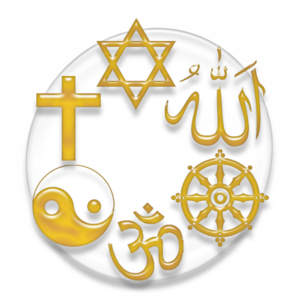 Image via Wikipedia
Image via Wikipedia
The most obvious rituals are used in religion. Every single religion regardless of genesis has a prescribed set of rituals. Indeed this is one of the hallmarks of organized religion. A question that often arises in the context of religion is why are all these rituals needed? Are they necessary to connect with God? Quite self evidently, the answer is no. So why the rituals? Does one necessarily have to be religious in order to be spiritual? There are a large number of people who think not; people who think that it is better to be spiritual rather than religious. Since religion also seeks to raise the spiritual level of an individual and in addition has a large number of rituals that must be adhered to, why not cut out the religion and focus on the spiritual.
Every religion, belief, spiritual practice etc. is an attempt to form a connection with the Divine. The ultimate goal is the attainment of a spiritual state where this connection becomes virtually effortless and part of an individual's daily life. Such a connection not achieved easily. It takes consistent major effort and a long duration. Not all people have the inclination or the capacity to put in the hard work (which can be both mental and physical) necessary. Nevertheless this desire remains. There is thus generally a gap between desire and achievable reality. This gap is bridged by rituals. Take for example the five daily prayers of Islam. Does God (Allah) need these prayers. No. The prayers are necessary to remind people of God (Allah). They require a certain amount of time to be set aside from worldly concerns and spend it instead on spiritual contemplation. Similarly other Muslim rituals serve comparable purposes. They are designed to help people gain a greater connection with the Divine through internal spiritual contemplation. What matters is not so much the act of the ritual itself as the state that it engenders in a person. Islam is not alone in this. The other major religions: Christianity, Judaism, Buddhism, Hinduism each have their own sets of rituals and mantras. Again the purpose is to help an ordinary believer to at least get started on the path of spiritual attainment. In this regard, rituals serve an important, indeed role.
The importance of rituals is not confined to our religious life only although generally it is perceived in this fashion. Rituals play an indispensable role in our daily lives. Everyone has a set of activities that are practiced to start and get through the day. What are these activities if not rituals? They play an important role by allowing us to do these activities without thinking about them. Then there are the rituals that are undertaken at a community or society level. The set of activities that are undertaken during marriages for instance. Each community has a set of rituals that are performed during a marriage. These rituals can differ amongst member of the same religion based on where they are living. So the marriage rites undertaken by Muslims in India and Pakistan are different from the marriage rites undertaken by Muslims in the Arab world. What about the activities taken during a national holiday? Most nations have unique ways of celebrating these i.e. they have a unique set of rituals that are used to commemorate these occasions. All these rituals play a role in forging a binding link within a community or a nation.
So rituals are not merely useless remnants of a dead past. They are an important link in a chain that joins our present with our past and will join our present with our future. Breaking this link disconnects us and leaves us rudderless.
The importance of rituals is not confined to our religious life only although generally it is perceived in this fashion. Rituals play an indispensable role in our daily lives. Everyone has a set of activities that are practiced to start and get through the day. What are these activities if not rituals? They play an important role by allowing us to do these activities without thinking about them. Then there are the rituals that are undertaken at a community or society level. The set of activities that are undertaken during marriages for instance. Each community has a set of rituals that are performed during a marriage. These rituals can differ amongst member of the same religion based on where they are living. So the marriage rites undertaken by Muslims in India and Pakistan are different from the marriage rites undertaken by Muslims in the Arab world. What about the activities taken during a national holiday? Most nations have unique ways of celebrating these i.e. they have a unique set of rituals that are used to commemorate these occasions. All these rituals play a role in forging a binding link within a community or a nation.
So rituals are not merely useless remnants of a dead past. They are an important link in a chain that joins our present with our past and will join our present with our future. Breaking this link disconnects us and leaves us rudderless.




